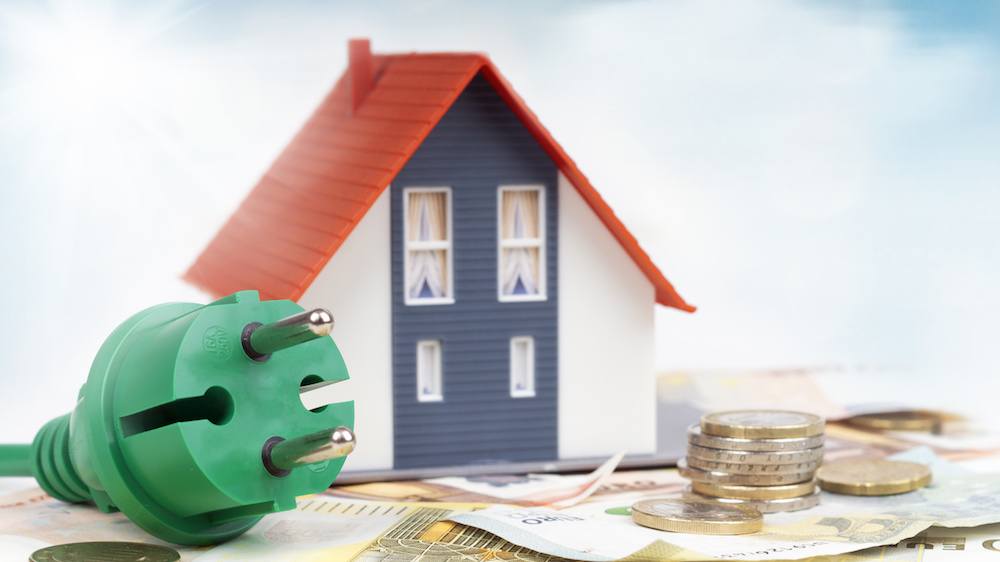
Empty house contract: when to subscribe to one and at what price?
In Belgium, any person who owns an electricity or gas meter is required to sign a contract with a supplier. Even if their house is empty!
Index
- When should you subscribe to an ‘empty house contract’?
- Is there a special rate?
- Prices of the proposed deals
- An energy contract that brings in money, is it possible?
- Stages and steps to be taken to get an ‘empty house contract’
This is so regardless of whether a dwelling consumes electricity and/or gas or not. Indeed, the owner of an empty or an unoccupied building, or which requires development work must also subscribe to a deal.
In this guide, we focus precisely on this second scenario. So, we are looking at contracts titled ‘Empty house contract’. To get a better idea of what we mean, let us analyse the different situations in which they are applicable and also set out the different stages and steps to be taken to benefit from them. And you will see that in some cases, ‘Empty house contracts’ can make you money!
When should you subscribe to an ‘empty house contract’?

In several cases, the owner of a building concludes a contract with an energy supplier for an electric meter and/or a gas meter that will either not be used or will be used very little. We can distinguish between three situations:
- The owner is waiting for a new tenant;
- The new owner of a property in which work is to be carried out;
- The owner of an empty or unoccupied building.
In order to keep buildings’ meters open, all owners are obliged to have a supplier for these meters, even if they are not used. Indeed, without a contract, the active distribution system operator (DSO) in your area will, after a while, begin the process of “closing the meter”.
This closure procedure is paid for (several hundred euros in some cases). The same applies to the reopening procedure that will be needed later to use these meters again. To avoid any inconvenience and unnecessary charges, therefore, every owner in one of the above situations must conclude an energy contract for each meter.
Is there a special rate?
In the light of these situations, the suppliers of electricity and gas in the Belgian market usually offer an adapted rate, called ‘empty house rate’. For some suppliers, a specific rate card is applicable. For others, it is simply an adjustment of the amount of the instalment.
It is important to ensure several key points when choosing your supplier and the deal best suited to this type of use. The priority criteria are:
- Welcome promotions granted for the transfer or the opening of meters;
- As low an annual fee as possible;
- A contract with an annual fee charged “prorata temporis” and not from the first day of consumption.
If you are not familiar with the concepts of annual fee or “prorata temporis” billing, our advisers are of course at your disposal to answer all your questions on 0800 37 456, by e-mail at info@energyprice.be or via our online chat tool.
Prices of the proposed deals
In contrast to contracts for occupied buildings, the kWh electricity and the m³ (or kWh) gas rates are not essential in the case of a property where there will be little or no consumption. However, low or moderate consumption of gas or electricity is not to be excluded in certain situations:
- Empty buildings that are heated to prevent deterioration;
- Use of electricity as part of some work;
- Etc.
In the various cases cited above, which is not an exhaustive list, it may be useful to estimate the energy consumption and to ensure a minimum to choose for a competitive kWh according to the energy used.
Let us consider a specific example. In our analysis, there is a difference of 208 euros between the most and the least suitable contracts in this kind of situation. The points of reference used to achieve this result are: 1 kWh for electricity and 1 kWh for gas at postal code 1000.

The choice of contract, even for a meter that will have almost zero consumption, can be crucial.
An energy contract that brings in money, is it possible?

Making money through meters that record no consumption is possible!
Indeed, if the ‘new customer’ reduction is bigger than the fixed fees charged by the network operator and the supplier’s annual fee, it is possible, at the end of the year, to receive a credit note.
For any contract entered into, you will be requested to make monthly advances or instalments. In this kind of situation, the minimum monthly payments are set a 10 euros per meter. This amount may vary according to the supplier chosen. By choosing the right contract and by consuming very little, it is possible to be reimbursed for your advances at the time of the meter reading (usually after one year).
If you do not know what contracts offer the most beneficial ‘new customer’ discounts, do not hesitate to contact our staff on 0800 37 456, by e-mail at info@energyprice.be or via our online chat tool.
Stages and steps to be taken to get an ‘empty house contract’
Below, we list the different situations in which an ‘empty house’ contract is necessary or when an adjustment of the amount of the instalment is required. In addition, each situation is set out depending on the status of the meter: open, closed or pre-paid meter.
1. You are an owner waiting for a new tenant
In this case, you must establish an energy contract in your own name until a new tenant starts to consume energy once more. As mentioned previously, it is important to conclude an energy contract to prevent the meters from being cut off by the network operator.
Here are the steps you must take if:
The meter(s) is/are open
- Complete the energy transfer document (PDF) at the time of the departure inventory: when the exiting tenant leaves the building, it is timely to complete an energy transfer document with them. This document is proof for the former tenant, but also for you. In addition, it will allow you to provide useful information to the supplier you choose, while waiting for a new tenant (meter readings, meter numbers, dates…).
- To establish a contract with a supplier: while waiting for a new tenant, it will be necessary to conclude a contract in your name with a supplier of electricity and/or gas.
The meter(s) is/are closed
- To establish a contract with a supplier: if the meter closed, the first step is the choice of supplier. Once you have appointed one, they will contact your DSO to come to reopen the energy meter(s)
- Contact your system operator to request opening the meter and make an appointment with an agent: even if your provider undertakes everything and informs your DSO of the reopening of your meter, you can take the initiative. Contact your DSO yourself in the 24 to 72 hours after concluding your energy contract.
It’s a pre-paid meter
- Fill the energy transfer document at the time of the departure inventory: similarly to standard meter opening, it is useful to fill in an energy transfer document. Beware, some providers may require some proof to activate a new contract. This document acts as valid proof for them.
- To establish a contract with a supplier, be it a pre-paid or a conventional meter, you will enter into a contract with an energy supplier present in Belgium.

The pre-paid budget is easily recognizable by its red and blue buttons.
Note that disabling a pre-paid meter due to moving house involves several stages. If you have questions, we are at your disposal on 0800 37 456.
2. You have just bought a property in which work is to be carried out
In this case, you must establish an energy contract in your name. Here are the steps you must take if:
The meter(s) is/are open
- Fill the energy transfer document at the time of the departure inventory: when buying your property, be sure to complete the energy transfer document (PDF) with the former owner. In this way, you will both have proof of change of ownership and meter readings at the time of exchange.
- To establish a contract with a supplier, you will then establish a contract with an energy supplier, for example on a site like Comparateur-Energie.be.
The meter(s) is/are closed
- To establish a contract with a supplier, again, if you have a closed meter, the first step will be to enter into a power contract with a supplier. They will then inform your DSO.
- Contact your system operator to request opening the meter and make an appointment with an agent: within 24 to 72 hours after concluding your energy contract, you can contact your DSO to organize a visit by an agent for reopening meter(s).
It’s a pre-paid meter
- Fill the energy transfer document at the time of the departure inventory: even though a pre-paid meter does not work like a conventional meter, it is timely to complete this document. This is to keep track of the meter reading when you arrive in your new property.
- To establish a contract with a supplier: as mentioned above, you must establish a contract with a supplier, even for a pre-paid meter. The contracts offered by suppliers for pre-paid meters are generally the same as for conventional meters.
- Ordering and receiving the disabling or supply card, if work is to be done in the building, it is preferable to disable pre-paid meters. This will prevent the pre-paid card in the meter from running out in the middle of the work!
3. You are the owner of an empty or unoccupied building

- Make a comparison: even with low or no consumption, it is possible to choose a competitive rate, thanks to “new customer” promotions. To find the most beneficial contract in your specific case, make a comparison of the price of electricity and/or gas in less than five minutes or contact us on 04/242.47.82 between 8:45 am and 12:30 pm and from 1:30 pm to 5:30 pm.
- Choose the offer that best fits your profile: once you have the results of the comparison, select the best offer and subscribe to the new contract in minutes. Reminder and tips by our consultants: choose the cheapest possible “prorata temporis” fee and select a contract with plenty of welcome promotions.
- Wait for the statutory notice and then get the best rates: the statutory notice period is a minimum of one month. Let us consider a specific example. If you subscribe to your new contract on 15 April, the cooling-off period will run from mid-April to late April, and May is considered the month of notice. Your contract will then start on 1 June (at the earliest). You will be sure to benefit from the best rates, even for your unoccupied building or where work is in progress.
If you still have any queries, send us an e-mail to info@energyprice.be or contact us on 0800 37 456.
By reading this article, it appears that the energy transfer document is an essential item to keep a written record of meter readings when a meter is transferred from one person to another. It is also the proof required by some suppliers to establish a new contract.
In addition, it seems timely to choose your electricity and/or gas contract. Even for a meter that will, in principle, not record any or will record very low kWh consumed after one year. With “new customer” promotions and the lowest possible “prorata temporis” fee, it is even sometimes possible get some money back from your supplier! You will thus have concluded an energy contract that will finally bring you in some money! Amazing, isn’t it?
Also read on our blog

Summary: Five suppliers hold sway in Belgium… and not necessarily the cheapest ones Astonishing fact: the most expensive pro…

Reducing electricity consumption in order to save money is within reach of everyone. As long as you adopt the right habits and kee…

Regularly comparing prices for your energy contract is essential. It means you can take advantage of the best market conditions. B…

It is now official: Energyprice.be is the first CREG-approved energy price comparison tool active in Belgium. In July 2018, C…